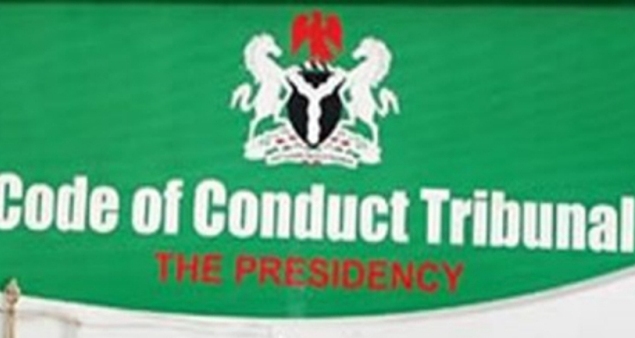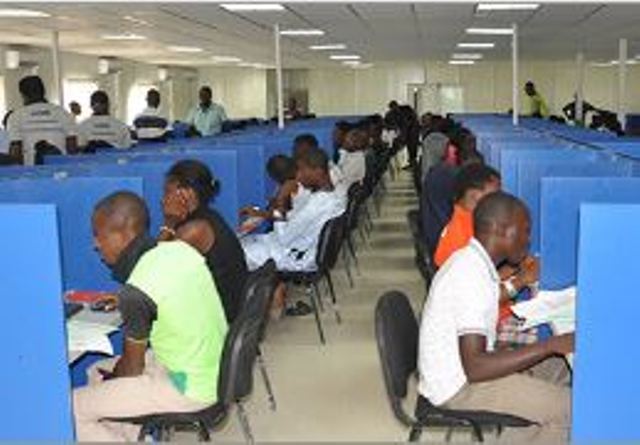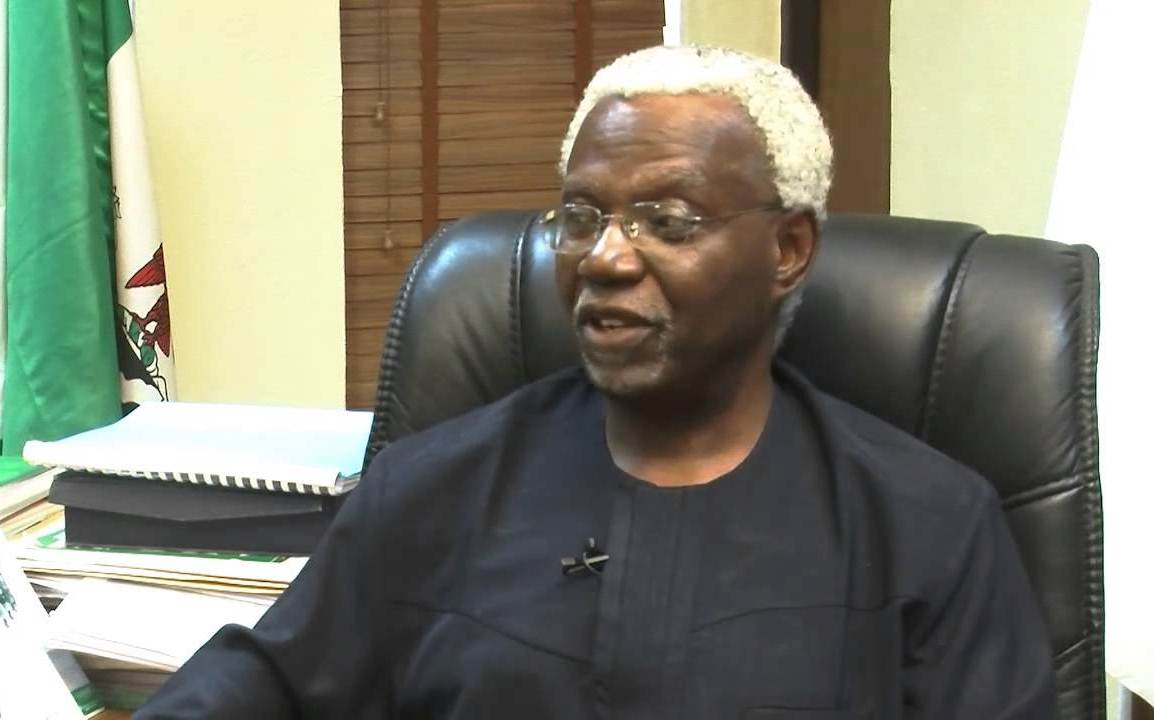Tag: ICPC
-
Security operatives raid ex-Vice President Namadi Sambo’s Kaduna home
Heavily armed security operatives on Wednesday raided the residence of a former vice president, Namadi Sambo, in Kaduna.
The operatives are believed to have come from the State Security Service, SSS, and the Independent Corrupt Practices and other related offences Commission, ICPC.
TheNewsGuru learnt that the operatives, who arrived at the scene in a bus and Toyota Hilux van around 3pm, cordoned off the road leading to the residence and barred motorists and pedestrians while the two-hour search lasted.
The spokesperson for the ICPC, Mrs. Rasheedat Okoduwa, told one of our correspondents on the telephone that she was not aware of the search and thus could not comment.
“I am just hearing about the raid from you. I am not aware of it and I have no information,” she said.
However, Sambo’s media aide, Mallam Umar Sani, said the ICPC officials came with a court order to search the place.
He stated that it was not the first time the house was being raided by the anti-graft agency.
Sani added, “This is not the first time they are searching the house. They have searched the house on numerous occasions. Today (Wednesday), they came with a court order and gave a copy of the court order to the CSO (Chief Security Officer) in the house.
“After they concluded the search, they wrote at the back page of the court order that they gave to the CSO that they didn’t find anything and they left. So, we are not surprised because it has now become a routine.”
The Economic and Financial Crimes Commission had carried out a similar search on one of Sambo’s properties in Abuja in 2016.
The former Vice-President had been allegedly linked to some cash disbursements during the build-up to the 2015 general elections, an accusation he had denied
-

CCT Judge queries use of public funds to buy vehicles for politicians
Hon. Justice Agwadza William Atedze of the Code of Conduct Tribunal (CCT) has queried the use of public funds to buy vehicles for politicians, and counselled Socio-Economic Rights and Accountability Project (SERAP) to research the issues “to see how best we can reconcile our social and cultural values viz-a-viz the entire war against corruption and advise our policymakers accordingly.”
Justice Atedze said this yesterday at the launch of SERAP’s latest report titled Combating Grand Corruption and Impunity in Nigeria: An Agenda for Institutional Reforms in Anti-Corruption Strategies. The report is published under a project to promote justice sector and anti-corruption oversight mechanism reform, which SERAP is undertaking in collaboration with the National Endowment for Democracy (NED), USA.
Apart from Justice Atedze who represented the Chairman of the CCT, Hon. Justice Danladi Yakubu Umar at the report launch, other anti-corruption agencies that attended the event were the Economic and Financial Crimes Commission (EFCC); the Independent Corrupt Practices and Other Related Offences Commission (ICPC); and the Code of Conduct Bureau (CCB).
Mr. Dauda Joki-Lasisi, Head of Procurement and Fraud Section of the EFCC who represented the agency at the report launch said that, “The fight against corruption can be likened to an allegory of a giant in the midst of ants, as little as an ant is, it may not be able to wear the trouser of a giant, but will remove it.”
The Head of ICPC Lagos Office Mr. Olufemi Nofiu; and Mr. T. Collins who represented the Chairman of the CCB, Mr. Sam Saba echoed similar sentiments, promising to “do anything and everything within their powers to curb corruption in the country in its entirety.”
All the anti-graft agencies renewed their commitment to work even harder to end the problem of grand corruption in the country, and end its devastating consequences.
Chairman of the report launch Barrister Babatunde Ogala said that, “Corruption is simply a way of life for us all, it is deep, when you steal as a religious institution, you are as corrupt as any Nigerian. In my opinion, corruption is both cultural and religious, corruption is as big as this country, the way of curbing it is by changing our national orientation.”
Barrister Ogala, who was former Chairman of the Lagos State House of Assembly Committee on Judiciary, also said that, “The EFCC ought to have offices even at the local government level. The society itself encourages and invests in corruption. As a legislator, I was constantly measured by what I did for individuals and not by the amount of law making I engaged in.”
The report contains several recommendations among which is the call to the Chief Justice of Nigeria (CJN), Hon Justice Walter Onnoghen, to “ensure that all judges fully utilise the provisions of the Administration of Criminal Justice Act (ACJA) in the hearing of grand corruption cases before them.”
Among other key recommendations, the report urges Justice Onnoghen to “ensure that judges, in situations where the ACJA rules apply, are made to follow the dictates of these innovative statutory interventions or face disciplinary action, and to incorporate into ongoing judicial trainings these crucial statutes and procedures as well as include the ACJA as part of the mandatory continuing legal education for all judges in Nigeria.”
The report also recommends that “The Chief Justice and all other judges should also periodically disclose and publish their assets. The Chief Justice should promote full independence for the National Judicial Council including by allowing retired judges of proven integrity to lead the council.”
Executive summary of the report read in part: “Corruption is a threat to democracy. It erodes confidence in and respect for democratic institutions and emerges as an obstacle to social, economic and human development. The fight against corruption is therefore crucial to achieve economic development and stability.”
“Anti-corruption agencies in Nigeria generally have not met widespread expectations mainly because of lack of political will of those in government to fight grand corruption; absence of an over-all national anti-graft strategy; inadequate legal framework and resources and/or lack of full and effective implementation of new initiatives; limited independence and public trust; lack of an enabling climate and necessary know-how, and lack of basic ethical values.”
“Anti-graft agencies should seek stiffer penalties for convicted corrupt officials and minimise the use of plea bargaining, to serve as deterrence; and the judiciary at all levels should assume leadership in this regard.”
“The Government of President Muhammadu Buhari and the Acting President Professor Yemi Osinbajo should instruct the Attorney General of the Federation and Minister of Justice Abubakar Malami, SAN to urgently ensure the full and effective implementation and enforcement of the Practice Directions on Serious Crimes, 2013, and the ACJA Act 2015 in all courts and tribunals handling cases of grand corruption to ensure that stalling of prosecution by defence lawyers becomes history.”
“The Government of President Muhammadu Buhari and the Acting President Professor Yemi Osinbajo should reform the anti-graft agencies in Nigeria with a view to granting them independence, freedom of action and adequate resources, so that they can carry out their mandates effectively.”
“The Government of President Muhammadu Buhari and the Acting President Professor Yemi Osinbajo should instruct anti-corruption agencies to urgently publish reports of their investigations into the allegations of budget padding by the leadership of the National Assembly and to prosecute anyone suspected to be involved in grand corruption. President Buhari and Acting President Osinbajo should also ensure adequate protection for the Whistle-blower Abdulmumin Jibrin.”
“The Government of President Muhammadu Buhari and the Acting President Professor Yemi Osinbajo should prioritise and give sufficient political and operational attention to the coordination of anti-corruption efforts, with coordination issues considered from the design stage of anti-corruption policy making, as many coordination efforts in the operations of anti-corruption agencies in Nigeria have failed because of their original design flaws.”
“The EFCC and ICPC should urgently come up with strategies for prioritising corruption cases within states and local government levels. Corruption should not only be fought at the Federal level but also at the state and local government levels.”
“The EFCC and ICPC should intensify processes to investigate and effectively prosecute state officials involved in diverting bailout funds”.
-

UTME 2017: JAMB partners EFCC, ICPC, Police to monitor exam centres
Sequel to reports of various challenges that marred previous conduct of its examination, the Joint Admission and Matriculation Board, JAMB, has said that operatives of the Nigeria Police, the Economic and Financial Crimes Commission, EFCC, and the Independent Corrupt Practices and other Related offences Commission, ICPC, will monitor the examination centres in the forthcoming Unified Tertiary Matriculation Examination, UMTE.
TheNewsGuru.com reports that the exams will commence from Saturday May 13, 2017.
JAMB Registrar, Prof. Ishaq Oloyede told newsmen in Abuja that each test centre will have a supervisor, a technical officer, a verification officer, three proctors as well as security agents.
“Each state will be superintended over by a head of a tertiary institution (Vice-Chancellor, Rector or Provost) who coordinates the supervisors under his or her jurisdiction”, Oloyede added.
“It is certainly not going to be business as usual in the conduct of the Board’s examination and other processes.
“In line with this resolution, the Board had secured through diligent prosecution, the conviction of two Nigerians who forged the Board’s results and came around for verification.
“At the moment, we have lodged complaints against a number of Computer-Based Test, CBT, centre owners for one infraction or the other and a number of them were arrested, cautioned, while others are to be prosecuted so as to serve as a deterrent to others”, he added.
The JAMB boss warned candidates not to fall for the ploy of fraudsters who he said were out to defraud them.
He pointed out a case at the Federal Government Science Technical College, Orozo,Federal Capital Territory, FCT, Abuja, where somebody was sending bulk messages to candidates to come and reprint their slips claiming to be from JAMB.
-

We can’t fight corruption alone – ICPC
The Independent Corrupt Practices and other related offences Commission (ICPC) has charged other federal agencies not to leave the fight against corruption for it and the Economic and Financial Crimes Commission (EFCC).
ICPC said other agencies should join them in the anti-graft fight so as to rip Nigeria of corrupt elements, thereby baling the county out of its social-economic challenges
ICPC’s commissioner in charge of Oyo and Ogun states, Mr. Stephen Pimor made this declaration while speaking at the lunch of anti-corruption postage stamps at the Ibadan area office of the Nigerian Postal Service (NIPOST).
Pimor who was represented by the Principal superintendent officer of ICPC Mr. Ayo Opara said corruption was not limited to embezzlement of public funds alone but that it could also be attitudinal.
“There’s general mistake that most of us in Nigeria make. Most people think that corruption is all about embezzlement of public funds. But the fact is corruption is all-encompassing and attitudinal.
“For instance, a civil servants who always comes late to work is corrupt. A civil servants who come to work early but refuse carryout is official duties as expected or is found to negligence and lackadaisical is nothing but corrupt”, he said.
Pimor advised Nigerians and corporate bodies to take the war against corruption being championed by the present administration seriously and give all the necessary support to Government to ensure success.
He commended NIPOST for teaming up with ICPC to stamp out corruption through the launching of the anti -corruption postage stamps, calling on other corporate organizations to emulate NIPOST.
Area Postal Manager NIPOST, Oyo territory, Mr. Babatude Ajayi earlier in his welcome address said that corruption had become so endemic in Nigeria that the fight against it should no longer be left in hands of anti-corruption agencies such as ICPC, EFCC and others
Ajayi said NIPOST decided to key into government policy directions by issuing a set of four postage stamps as part of its contribution towards sensitizing Nigerians on the menace of corruption.
He described the lunch of the postage stamps as timely, saying “the fight against corruption in our history as nation has never been this fierce and productive.”
-
ICPC recovers 14 Hilux vans, Jeeps, other exotic cars from ex-govt. officials
The Independent Corrupt Practices and other Related Offences Commission (ICPC) said it recovered over 40 exotic cars from ex-officials of the Federal Ministry of Water Resources.
TheNewsGuru.com reports that the recovered vehicles had since been handed over to the Ministry.
An ICPC official, Alhaji Bako Abdullahi, officially handed over the vehicles to Hajia Rabi Jimeta, the Permanent Secretary of the ministry, on Wednesday in Abuja.
Abdullahi, who represented the ICPC Chairman, Ekpo Nta, said that the recovered vehicles were dishonestly carted away by some retired officers of the ministry.
“It is extremely sad that vehicles meant for the administrative and operational uses of the government establishment were dishonestly confiscated by some retiring senior public officers that included directors and deputy directors.
“However, the recovery is fulfilling because the commission has been alive to her law enforcement and prevention mandate in the fight against corruption,’’ Abdullahi said.
The vehicles, which were handed over to the ministry included 14 Hilux pick up vans, 14 jeeps, three Toyota Avensis and seven Toyota Corolla cars.
Others are one Toyota Camry and one Audi A6 cars.
Abdullahi said investigation had started on the confiscation of the vehicles, adding that those involved would soon be prosecuted.
Jimeta, who received the vehicles on behalf of the Minister of Water Resources, commended ICPC for the laudable recovery.
She disclosed that the vehicles were not boarded for the officials but they decided to go away with the vehicles after their retirement.
Jimeta said the affected officials acted with impunity, adding that their action negated government rules and regulations.
“Don’t take government or public properties away with impunity; it is an act of irresponsibility and indiscipline,’’ she said.
Jimeta said that the lack of operational vehicles has been one of the major factors militating against the service delivery of the ministry.
She said that the recovered vehicles would enable the ministry to function effectively, particularly in the remote areas.
TheNewsGuru.com that Mr Frank Nanakumo, ICPC’s Director of Assets Tracing, was the brain behind the recovery.
A source in the commission said, on condition of anonymity, that the vehicles’ retrieval was as a result of anonymous petitions.
The source said that that some of the affected directors and deputy directors retired from service over eight years ago, while others retired recently.
He said that ICPC would also beam its searchlight on other ministries so as to provoke such recoveries.
